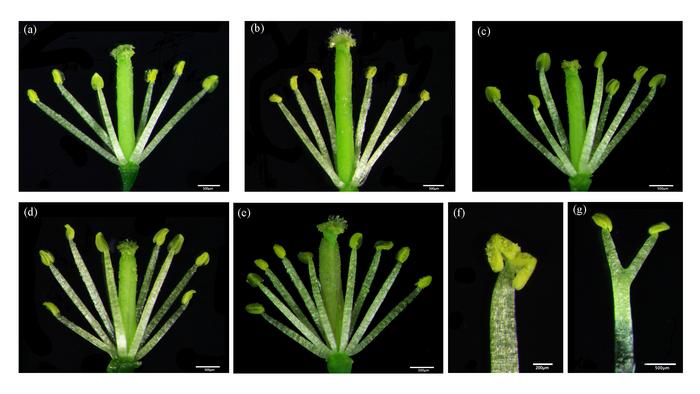Labile expression of sex was frequently reported by empirical observation in a variety of Populus species, but the underlying genetic mechanism remains largely unknown.

Credit: Horticulture Research
Labile expression of sex was frequently reported by empirical observation in a variety of Populus species, but the underlying genetic mechanism remains largely unknown.
This article has been published on Horticulture Research with title: The proposed role of MSL-lncRNAs in causing sex lability of female poplars.
In this study, we carried out a systematic study on a maleness promoting gene, MSL, detected in Populus deltoides genome. Our results showed that both strands of MSL contained multiple cis-activating elements, which generated long non-coding RNAs (lncRNAs) promoting maleness. Although female P. deltoides did not have the male-specific MSL gene, a large number of partial sequences with high sequence similarity to this gene were detected in the genomes of a variety of sequenced poplars. Based on sequences alignment, the MSL sequence could be divided into three partial sequences, and heterologous expression of these partial sequences in Arabidopsis confirmed that they could promote maleness. In contrast to the tetradynamous stamens (four long and two short ones) of the wild-type flowers, we observed flowers with six long stamens, seven or eight or nine stamens, or stamens bearing two anthers, or branched stamens in the transformed lines (Fig. 3). Based on effect of MSL sequences on androecia development observed in this study, we proposed a molecular model triggering sex lability in female poplars (Fig. 4). In this model, activated transcription of MSL homologous sequences only leads to female lability, but does not cause male lability.
Our study Results in this study showed that activated transcription the MSL homologous sequences could promote maleness in heterologous expressed Arabidopsis. If these maleness promotors express in female poplars, they would lead to female lability. This study provided a unique perspective for better understanding the female sex lability in poplars.
###
References
Authors
Jinyan Mao1#, Suyun Wei1#, Yingnan Chen1, Yonghua Yang2, Tongming Yin1*
Affiliations
1 State Key Laboratory for Tree Genetics and Breeding, Co-Innovation Center for Sustainable Forestry in Southern China, Key Laboratory of Tree Genetics and Biotechnology of Educational Department of China, Key Laboratory of Tree Genetics and Breeding of Jiangsu Province, Nanjing Forestry University, Nanjing, 210037, China
2 Institute for Plant Molecular Biology, State Key Laboratory of Pharmaceutical Biotechnology, School of Life Sciences, Nanjing University, Nanjing 210023, China
About Tongming Yin
Tongming Yin, a professor at Nanjing Forestry University, was born in February 1970. Research fields including Forest Tree Genetic Breeding, Molecular Genetics, Forest Genome and Bioinformatics. The articles have been published in international and domestic top journals such as Science, Nature, Nature Communications, New Phytologist, Plant Journal, Plant Physiology, Genome Research, Horticulture Research, etc.
Journal
Horticulture Research
DOI
10.1093/hr/uhad042
Method of Research
Experimental study
Subject of Research
Not applicable
Article Title
The proposed role of MSL-lncRNAs in causing sex lability of female poplars.
Article Publication Date
13-Mar-2023
COI Statement
The authors declare that they have no competing interests.



